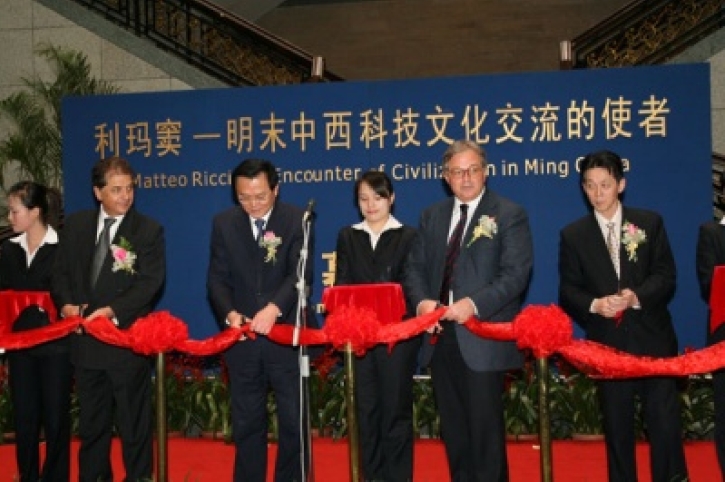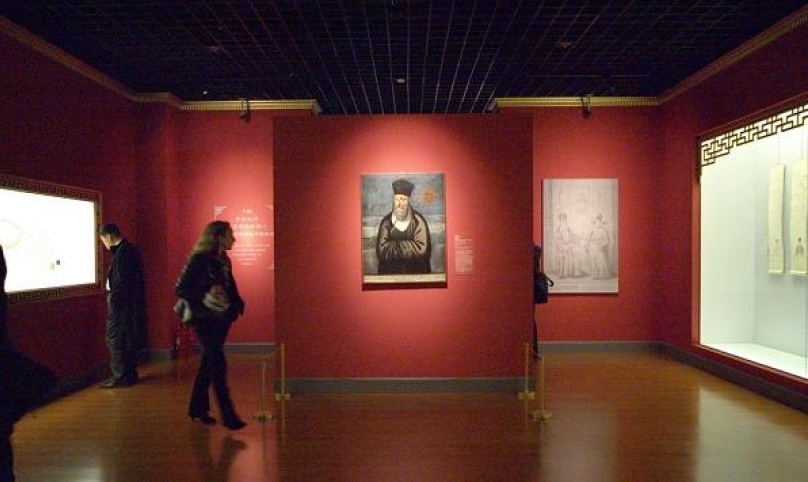May 11th marks the 400th anniversary since the death of Matteo Ricci, a highly-regarded Italian Roman Catholic Jesuit priest who was among the pioneers of bringing the gospel to China, in 1610.
In honor of his contributions made toward the cultural exchange between the Chinese and the West, exhibitions has been held in Beijing and Shanghai and will continue in Nanjing and Macao after May 23rd.
Organized by government of Marche, Rome, and Art Exhibitions China, “Matteo Ricci – A European in China” conference began on April 2nd, displaying a total of 113 sets of items that were brought over from museums in Shanghai, Beijing, Nanjing, Liaoning, Rome, Macerata, Genova, and scores of others.
Chronicling the life of Ricci, the show leads the viewers to the time of his birth, education, process of entering the Jesuits, journey to China, and the traces of his footprints in every Chinese city. The organizing committee hopes to present a more complete journey of his heart to today’s public.
According to Ricci’s living arrangements, the artifacts, pictures, and words are presented in a closely connected manner in 12 different sections. Besides his writings and items used each day, the show also resurrected the representing western art pieces that had the influence of the Renaissance during Ricci’s lifetime. They include Raffaelo’s Eternity and Angel, Tiziano’s Philip II Portrait, Lotto’s Power and Unfortunate War, among others.
At the last section of the exhibition stands two very important: one is a painting by Shengmo Suo, a renown Chinese painter from the late Ming and Qing Dynasty, that praised friendship, which Ricci’s friendship with the Chinese literati has helped to achieve his work; another is an oil painting by Ricci’s disciple You Wen-hui painted after Ricci’s death – the first actual documented oil painting by a Chinese.
This portrait of Ricci was later brought back to Rome and stored inside the Jesuit’s headquarter. After 400 years, this portrait was brought back to China, drawing upon the attention of the public.
In 1538, Ricci traveled along the ship route pioneered by Vasco da Gamma to India, beginning his mission journey to the Far East. Five years later, he set foot on Macao and started learning the Chinese language and traditions, and he stayed in China until his death.
Ricci is one of the pioneers of spreading Catholicism into China. When he arrived in China, missionaries were being evicted by the Chinese imperial officials and the people; just before his death in Macao, Francis Xavier, the first Jesuit priest to China, exclaimed, “Oh rock, when can it be opened?”
Seeing Xavier’s plight, Ricci was especially cautious in his approach for work in China. After much observation, he decided to befriend those in the Chinese Confucian literati class and successfully made inroads into the Chinese society.
With deep respect towards Chinese civilization, Ricci was the first westerner to deeply understand the Chinese literary classics, the first to adapt a Chinese name converted from western name, and the first to spread the gospel to the Chinese through cultural exchange, science, and various methods. Xu Guangqi, a well-known Confucian scholar at that time, was led to convert to Christianity.
While conducting missions, Ricci brought European mathematics, astrology, and other scientific knowledge to China, which opened the eyes of Confucian scholars in Ming Dynasty to understand the western philosophies and religion, precision instruments, and artistic paintings. He is the first to practice “Western learning as body and Chinese learning for use” (Xi Xuay Don Jien). In addition, he also translated the Chinese literary classics and disseminated Chinese culture to Europe.
In 1610, Ricci died in Beijing at 58 years old. Just before his death, he left his dying will with another missionary, saying that he has left his homeland, traveled tens of thousands of miles, came to China, and he has no regrets, and he hoped that the series of books that he has composed together with Xu Quangqi can be completed and be used to change the thoughts of the Chinese people.









